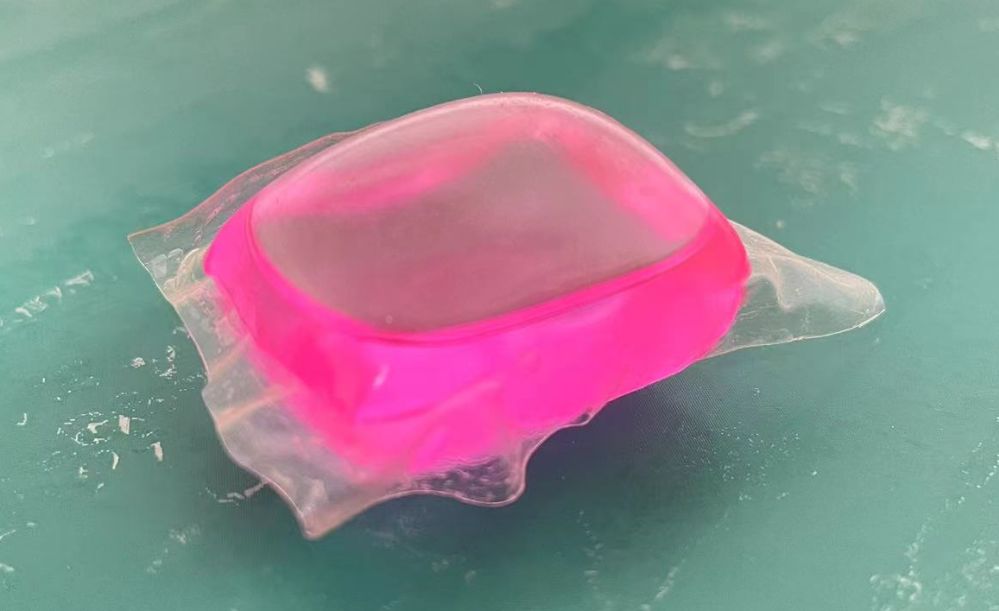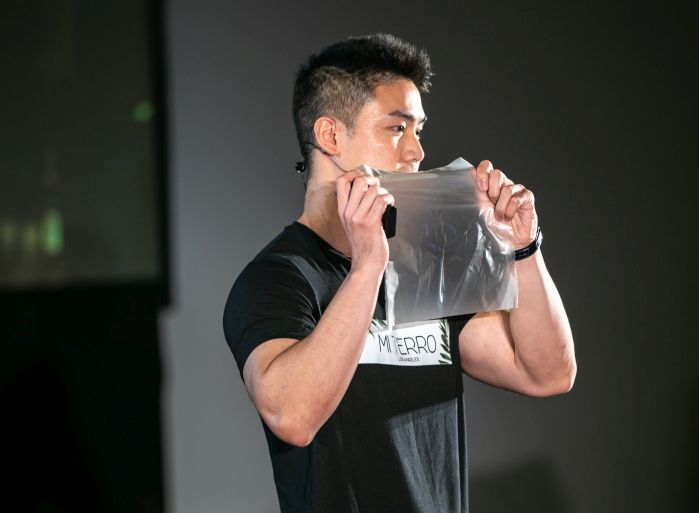Mi Terro—a startup originally upcycling casein proteins from expired milk to make tee-shirts—is now tapping waste streams from potato peelings to brewers’ spent grains to create cost-effective replacements for polyvinyl alcohol (PVA), a petrochemical-derived film used in laundry and dishwasher pods.
Appealing though the concept of replacing polyester clothing with upcycled milk first appeared, says Mi Terro founder and CEO Robert Luo, the economics of the patented process didn’t add up. “We could never get close to polyester on price, so we started looking at replacing flexible films such as PVA with other forms of agricultural waste.”
“That’s when we got connected with [brewing giant] AB InBev in China, where we launched a paid pilot to create a label for their beer bottles [made using the brewer’s spent grains], and joined the 100+ accelerator, which was co-sponsored by AB InBev, Coca-Cola, Colgate-Palmolive, and Unilever.
“We then launched another paid pilot with Unilever making water soluble flexible films that it could test on detergent pods and laundry pods,” says Luo, who cofounded Mi Terro in 2018 with Dr. Shengfu Chen (chief science officer), a professor in the department of chemical and biochemical engineering at Zheijang University in Hangzhou, China.
“We extracted the protein and fiber from the spent grains and then modified it into resins using existing manufacturing equipment via a patented process. However, we now believe that working with polysaccharides from potato peelings and cellulose from the byproduct of paper production, is a cheaper approach.”

‘Our film can be at price-parity with PVA film when we reach 600 tons of annual production’
According to Luo, Mi Terro’s patent-pending production process is more energy efficient than conventional PVA production. “We use existing plastic equipment such as a twin screwed extruder and a blown film machine to make resins and films. Our process is primarily chemical. Our film can be at price-parity with PVA film when we reach 600 tons of annual production.”
He adds: “If we’re talking about the technology readiness level, we are around seven, so we have validated the R&D and have a proof of concept. Now we have to supply higher quantities of these materials to our partners for them to trial.”
The company, which has raised around $1.5 million in seed funding, has small teams in China and in Los Angeles. It is now looking to raise around $5 million in a pre-series A round later this year in order to get a pilot facility in China up and running, says Luo.
“This will help us to build a production line capable of producing around 600 to 1,000 tons of PVA replacement annually. So that facility will be our initial pilot-scale demonstration facility, but once we scale up, we will potentially license or outsource production to our partners.”
‘SPB has trialed many bio-based solutions, but none of them was able to be formulated into pods’
PVA is derived from petrochemicals, and while it is water soluble, there are concerns about its threat to the ecosystem, prompting CPG companies to look at more sustainable alternatives, he says, although the American Cleaning Institute insists dissolved PVA polymers are “fully biodegraded by microorganisms in water treatment facilities and the environment.”
“These brands understand they have an urgent need for change,” adds Luo. “But they haven’t yet found a solution in the market. We want to be the first and the most scalable solution they work with.”
As for the competitive set, he says, “We have seen PVA manufacturers such as Kuraray trying to create bio-based PVA from sugarcane, but the cost is still too high, so nothing from the fermentation process has scaled up yet. Given that the cost of plastic has dropped recently, there is a lesser incentive for them to continue that route.”
“We’ve seen everything from fermentation-based approaches to seaweed [to replace PVA], but the costs are high and it’s very hard to replicate its properties. Our partner [Spanish personal care company] SPB Global, for instance, has trialed many bio-based solutions, but none of them was able to be formulated into pods. We were the first able to meet their mechanical requirements and the water dissolution time requirement and we’ve just signed a joint development agreement.”
He adds: “We also have signed purchase orders from Unilever and Henkel to trial our materials and work with us and we’ve signed an MOU [memorandum of understanding] with Mitsui Bussan Packaging based on the proposed purchase and distribution by Mitsui of certain proprietary bio-based packaging material owned by Mi Terro.
“We are also working on water resistant materials from agricultural waste, but our priority is the PVA replacement.”





